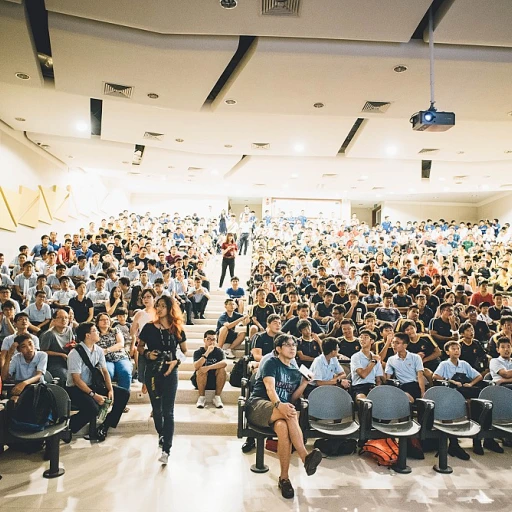Understanding AI in HR
Decoding AI's Role in Human Resources
Artificial Intelligence (AI) is transforming the landscape of human resources by automating tasks, enhancing decision-making, and providing insights that were previously unimaginable. At its core, AI in HR involves the use of algorithms and data-driven technologies to streamline various processes, from recruitment to employee engagement.
AI technologies can analyze vast amounts of data quickly and accurately, which helps HR professionals make informed decisions. This data-driven approach is crucial for improving efficiency and effectiveness within HR departments. For example, AI can assist in identifying the best candidates for a job by analyzing resumes and predicting candidate success based on historical data.
Moreover, AI tools can enhance the employee experience by personalizing interactions and providing support in real-time. These tools can manage routine inquiries, allowing HR professionals to focus on more strategic tasks. This shift not only improves productivity but also fosters a more engaging work environment.
However, it's important to acknowledge the challenges and ethical considerations that come with integrating AI into HR. Ensuring data privacy and avoiding biases in AI algorithms are critical to maintaining trust and fairness in HR practices.
As AI continues to evolve, its impact on HR will undoubtedly grow. By understanding its current role and potential, organizations can better harness AI to achieve their HR goals. For more insights on how AI is influencing HR practices, you might explore the advantages of human resource accounting.
Streamlining Recruitment Processes
Optimizing Talent Acquisition with AI
In the fast-paced world of human resources, recruitment is often the most challenging yet crucial task. Artificial intelligence is transforming how organizations approach talent acquisition, making the process more efficient and effective. By leveraging AI, HR teams can enhance their recruitment strategies, ensuring they attract and retain the best talent.
Automating Routine Tasks
One of the most significant benefits of AI in recruitment is the automation of repetitive tasks. AI-powered tools can handle initial resume screenings, schedule interviews, and even conduct preliminary assessments. This automation not only saves time but also reduces the risk of human error, allowing HR professionals to focus on more strategic activities.
Improving Candidate Matching
AI algorithms can analyze vast amounts of data to identify the best candidates for a position. By assessing skills, experience, and other relevant factors, these algorithms can match candidates to roles more accurately than traditional methods. This data-driven approach ensures that HR teams are considering the most suitable candidates, improving the overall quality of hires.
Enhancing Diversity and Inclusion
AI can also play a pivotal role in promoting diversity and inclusion within organizations. By eliminating unconscious bias from the recruitment process, AI tools ensure that all candidates are evaluated based on their qualifications and potential. This objective approach can lead to a more diverse workforce, which is essential for fostering innovation and creativity.
Insights into Recruitment Strategies
With AI, HR teams gain valuable insights into their recruitment processes. By analyzing data from past hires and current candidates, AI tools can identify trends and areas for improvement. This information allows organizations to refine their recruitment strategies, making them more effective and efficient. For more on how AI can optimize HR processes, explore the advantages of human resource accounting.
Enhancing Employee Experience
Transforming the Employee Journey
Artificial intelligence is revolutionizing the way organizations enhance their employees' experiences, offering numerous benefits to both the HR departments and the workforce. By utilizing {{ keywords }} such as chatbots and sentiment analysis tools, companies can significantly improve communication and satisfaction within the workplace.
One of the primary applications of AI in enhancing employee experience is through personalization. By analyzing vast amounts of data, AI can help create personalized career development plans, tailored learning opportunities, and customized benefit packages that align with individual preferences and needs.
AI-driven analytics also play a crucial role in understanding employee engagement and satisfaction. By continuously monitoring feedback and behavioral patterns, organizations can proactively address any potential issues, resulting in higher retention rates and improved morale. Tools like AI-powered sentiment analysis provide real-time insights into employee emotions, empowering HR managers to take timely action.
Moreover, AI facilitates seamless onboarding processes by providing immediate responses to queries via chatbots and virtual assistants. This not only aids in swiftly integrating new hires into the company culture but also ensures they have access to relevant information at their fingertips, enhancing their initial experience with the organization.
For organizations seeking to delve deeper into how AI elevates the employee experience, resources like the AIHR Institute's exploration on AI's role in HR provide valuable insights into the implementation and outcomes of AI technologies within HR functions.
Data-Driven Decision Making
Harnessing Data for Strategic HR Decisions
In the realm of human resources, AI acts as a powerful tool for data-driven decision-making, granting HR professionals the capacity to assess data with unprecedented precision and speed. As technology permeates every sector, organizations are looking to bridge HR processes and data analytics to optimize their strategies and outcomes. Traditionally, HR decisions were based on experience and intuition. However, integrating AI into HR practices enables a more analytical approach, transforming how decisions are made and actions are taken. AI systems can process vast amounts of data, recognizing patterns and trends that may not be immediately evident to human analysts. The advent of AI in HR allows for:- Predictive Analytics: By utilizing predictive models, organizations can anticipate future trends and prepare accordingly. This predictive capability helps improve talent management, assess employee performance, and forecast workforce needs.
- Personalized Insights: AI can tailor insights specifically to individual needs or departmental requirements. This ensures that managers receive the data most relevant to their decision-making processes, fostering more informed choices and enhancing employee management.
- Efficient Resource Allocation: Data can be leveraged to optimize the distribution and use of resources within the company. AI's analytical prowess ensures resource allocation strategies are refined, reducing costs and enhancing productivity.
Challenges and Ethical Considerations
Balancing Innovation with Responsibility
When incorporating artificial intelligence in human resources, organizations must navigate both opportunities and challenges. AI can revolutionize recruitment strategies and improve the employee experience, but it also comes with ethical considerations that cannot be overlooked. AI systems, by nature, utilize vast quantities of data. This data-driven approach, while providing actionable insights and improving decision-making, can also lead to significant privacy concerns. Companies must ensure that their use of AI is compliant with data protection regulations. Transparency in how AI algorithms operate and process data is critical to building trust among employees and stakeholders. Additionally, AI in HR can inadvertently lead to biases if not monitored carefully. Algorithms can perpetuate inequality if they rely on historical data that reflects existing prejudices. It is essential to continuously evaluate and audit AI systems to prevent discriminatory practices.Establishing Ethical Standards and Regulations
Organizations should advocate for ethical standards and strive for fairness and accountability in AI implementation. This involves:- Setting clear guidelines for responsible AI use and ensuring these are firmly ingrained in corporate culture.
- Engaging interdisciplinary teams to oversee and provide insights on AI integrations.
- Conducting regular audits and updating systems to prevent bias and ensure compliance with ethical standards.
Collaborative Efforts for a Balanced Approach
Successful integration of AI into HR processes requires collaboration between HR professionals, data scientists, and ethicists. This multidisciplinary approach helps balance innovation with safeguarding ethical standards, ultimately fostering an environment where AI can thrive responsibly within the workplace.Future Trends in AI for HR
Technological Advancements and the Evolution of HR
The landscape of artificial intelligence in human resources is rapidly evolving, bringing forth a wave of new technological advancements that promise to reshape the way organizations manage their workforce. As AI continues to develop, it's essential to stay informed about the emerging trends that will influence HR practices.- Integration of Machine Learning: Machine learning algorithms are becoming increasingly sophisticated, enabling HR departments to analyze vast amounts of employee data and predict trends with greater accuracy. These insights facilitate proactive decision-making, ensuring that HR strategies align with organizational goals.
- AI-Powered Personalization: The personalization of employee experiences through AI-driven platforms is set to enhance engagement and satisfaction. By understanding individual preferences and behaviors, companies can curate tailored career development paths and learning opportunities, fostering a more inclusive and adaptive workplace environment.
- Enhanced Data Security: With data being at the core of AI applications, HR departments will need to invest in stronger cybersecurity measures to protect sensitive information. Ensuring the privacy of employee data will be crucial as AI systems become more deeply integrated into HR operations.
- Increased Focus on Ethical AI: As AI tools become central to HR functions, there will be a growing emphasis on ethical considerations, such as preventing bias in AI algorithms and ensuring transparency in AI-driven decisions.








